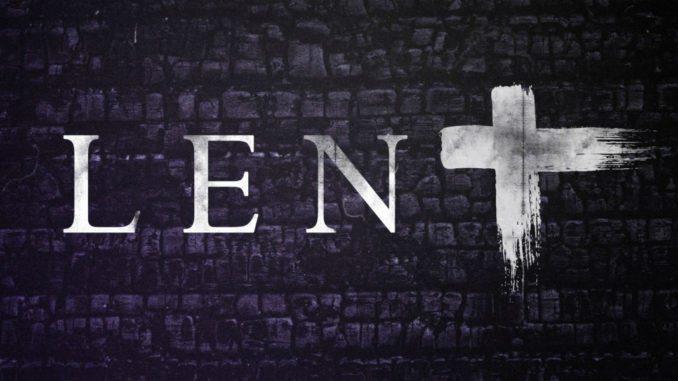
BELIEVERS DISCUSS PERSONAL LENTEN SEASON CUSTOMS AND PRACTICES
By W. Thomas Smith Jr.
What are you giving up for Lent? That’s the oft-repeated question during the 40-day period of reflection, repentance, and heart-preparation prior to Holy Week and Easter. Those who genuinely commit to observing the Lenten season usually choose to sacrifice something in-and-from their lives (which is where we get the “giving up”) and this sacrifice is usually in the form of fasting from something the Lent observer enjoys eating or drinking.
Those who genuinely commit to observing the Lenten season usually choose to sacrifice something in-and-from their lives (which is where we get the “giving up”) and this sacrifice is usually in the form of fasting from something the Lent observer enjoys eating or drinking.
In previous years, I’ve personally given up ‘sweets’ or soft drinks – things I should not be consuming anyway – or I’ve chosen specific days during Lent in which to fast from all food and drink except water and coffee. It wasn’t easy; nor was it difficult. And the act of fasting was and is spiritually awakening in ways I won’t get into now.
What I want to talk about here is how believers are uniquely observing this holy season. So I asked several friends, a few co-workers, colleagues, and members of my Sunday School class how they were and are observing the season. The answers were as varied and interesting as the people themselves.
“I’m giving up Twitter for Lent,” says attorney, church elder, and former Naval officer Anthony Livoti.
Livoti’s fellow classmate at The Citadel, Col. Bill Connor, a U.S. Army infantry officer, says he’s giving up sweets and “turning more regularly to the pages of Scripture.”
Anne Turner, a Christian women’s ministries leader, says, “I plan to be intentional about encouraging at least one person a day for the 40-day period and beyond. Hopefully it will then be part of my character and will flow out naturally. Holy Spirit help will be needed daily!”
Turner’s “40 days and beyond” are key according to some of those queried.
Attorney and regular Sunday School teacher Kendall Walker makes the case that though “an additional spiritual focus on Christ’s death and resurrection” is a good thing, it needs to be “a long-run focus rather than just a few days’ worth of attention.”
Walker adds, “I do not support the idea of giving-up or sacrificing something for a period of time, in that I see no scriptural warrant for it as an ongoing New Testament practice; nor do I support any idea that physical self-denial generates a spiritual benefit or impresses God with our devotion. If it’s somehow spiritual to engage in physical self-denial for 40 days, why not 365 days and forever?”
I agree with Walker, as do a few others to which I posed the question. But I also believe that the 40 days can be a form of renewal or a means of inspiring others as well as ourselves to lifelong action.
Gail Harrison, a women’s ministries leader like Turner, says she and her 23-year-old son who lives away from home will be journaling together.
“I gave everyone in my family ‘gratitude journals’ for Christmas, and he hasn’t really used his not knowing what to write,” says Harrison. “This Lenten season we are making a commitment to write in ours every day. Since his challenge has been to find a topic, I gave him some starting points – something specific that we are thankful for in our life: A certain friendship, good health, answers to prayers, ways that God has provided for us even when He does it without our asking.”
Attorney and S.C. Floodwater Commission chairman Tom Mullikin views Lent as another opportunity to strengthen one’s faith through the focused disciplining of oneself in a particular season. “This, for me, is a period for renewed spiritual disciplining,” says Mullikin. “Throughout Lent, I am meditating on, reading about, and reflecting on the meaningful lessons of Christ.”
Christopher Holton, a counterterrorism expert and vice president for Outreach at the Washington, D.C.-based Center for Security Policy, says that far too often he’s given up something that he should not have been doing in the first place. “That’s not a sacrifice,” says Holton.
Among this year’s Lenten commitments, Holton says, “I am making sure I pray more daily for my family, friends and our enemies especially. I’m reminding myself of what Jesus endured and did for my sins. I’m staying off LSU football/basketball/baseball message boards. I’m exercising at least six days per week to be a good steward of the health God has graced me with. And I’m doing something kind for someone every day.”
Mary Turbeville, a primary Montessori teacher, says, “I use the Cradle to the Cross wreath. It’s the the same wreath I used at Christmas, but with Jesus and a cross replacing Mary on the donkey. I have extensions on the wreath to make it for 40 days. I ordered it from Caleb Voskamp after seeing it on Ann Voskamp’s website.”
She adds, “I light a candle each night. I listen to The Passion New Orleans soundtrack which was from Tyler Perry’s The Passion Live in New Orleans television special. I loved the special and the soundtrack really speaks to me.”
Turbeville is also reading through the four Gospels: Matthew, Mark, Luke, and John. “I have more time for thought and reflection in the evening so that is when I set aside time for reflection and preparing my heart for Easter,” she says.
Who and what else?
Richland County Sheriff Leon Lott says that during the period of Lent he will be renewing a lifestyle of healthy eating. “I’m also trying to read to as many classes of kids I can,” he says.
Time with children is important to Lott who regularly schedules visits with elementary schools throughout the Midlands of South Carolina in order to spend time with the younger students, answer questions about the work and responsibilities of a police officer, and then read to them from some of his and their favorite storybooks.
Capt. Maria Yturria, director of the Richland County Sheriff’s Department’s public information office, says she is striving to be more tolerant of others. “To recognize that we each carry our own cross,” she says. “I may not always know why others act and respond a certain way, but I should not allow them to dictate my actions.”
Yturria adds, “In our home, we are also giving up sweets and putting the money aside to donate to our church which at the end of Lent will donate to help with the locust plague in Ethiopia.”
Col. Steve Vitali, U.S. Marine Corps (Ret.), is giving up Diet Cokes. “I’ve been drinking like three a day, so that’s what I think would be appropriate for me to give up at Lent,” he says. “I am also seeking to be more disciplined in my daily prayers with the Lord and daily reading of Scripture.”
Chris Carter, a Missouri-based military writer, says, “Instead of giving up something bad this year, I am doing something good: creating a habit of praising God.”
These are all friends. So what about me? How am I observing Lent? A bit different than previous years. Recently, I’ve been learning to play the shofar (an ancient – perhaps the world’s oldest – wind-instrument, made from a ram’s horn). The shofar is written about quite a bit in the Old Testament. Shofars were carried by Gideon’s men against the Midianites, and by Joshua’s forces before the ill-fated walls of Jericho. The sound of the shofar, similar to a trumpet’s, is said to be a call to repentance. It also celebrates the anointing or the coronation of a King, and it is said to confuse and drive away “the enemy.”
As part of my Lenten observances, I’m blowing the shofar in a different and significant location every day or night in central S.C. between now and the end of 40 days. So far, I’ve blown blasts from it on the S.C. State House steps, the historic horseshoe on the University of South Carolina campus, the Kershaw-Lord Cornwallis House in Camden, and on the western bluffs of the Congaree River. If nothing else, it’s keeping me in focused practice, and it is refocusing and perhaps even reenergizing a portion of my daily time with God.
A blessed Lenten season to all.
– W. Thomas Smith Jr. is a New York Times bestselling editor and military technical advisor. Visit him online at uswriter.com.
